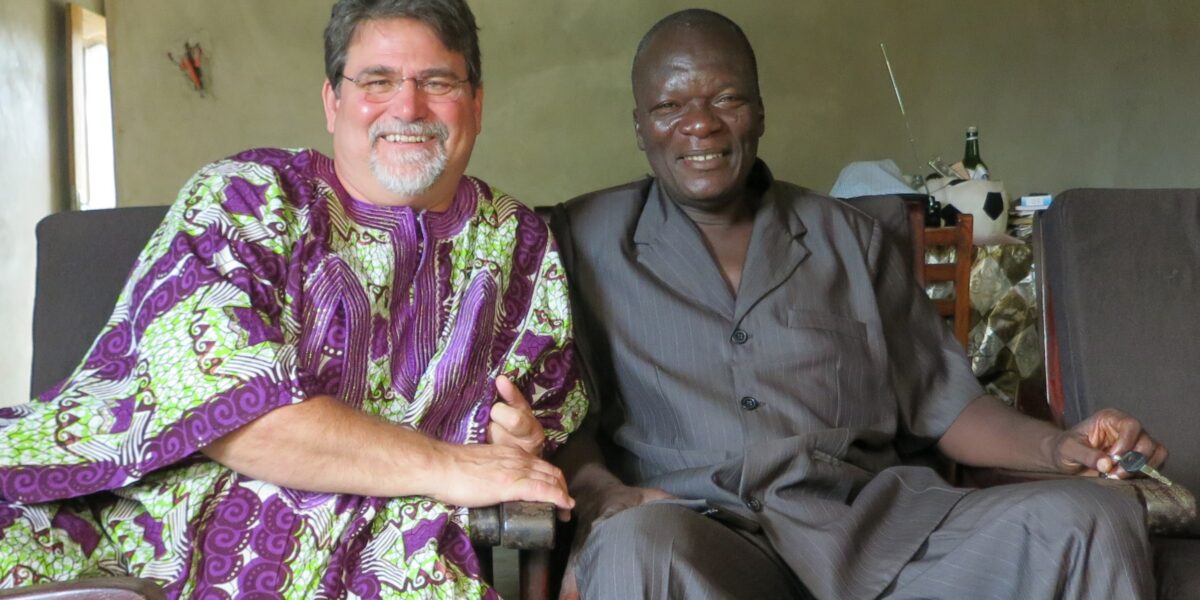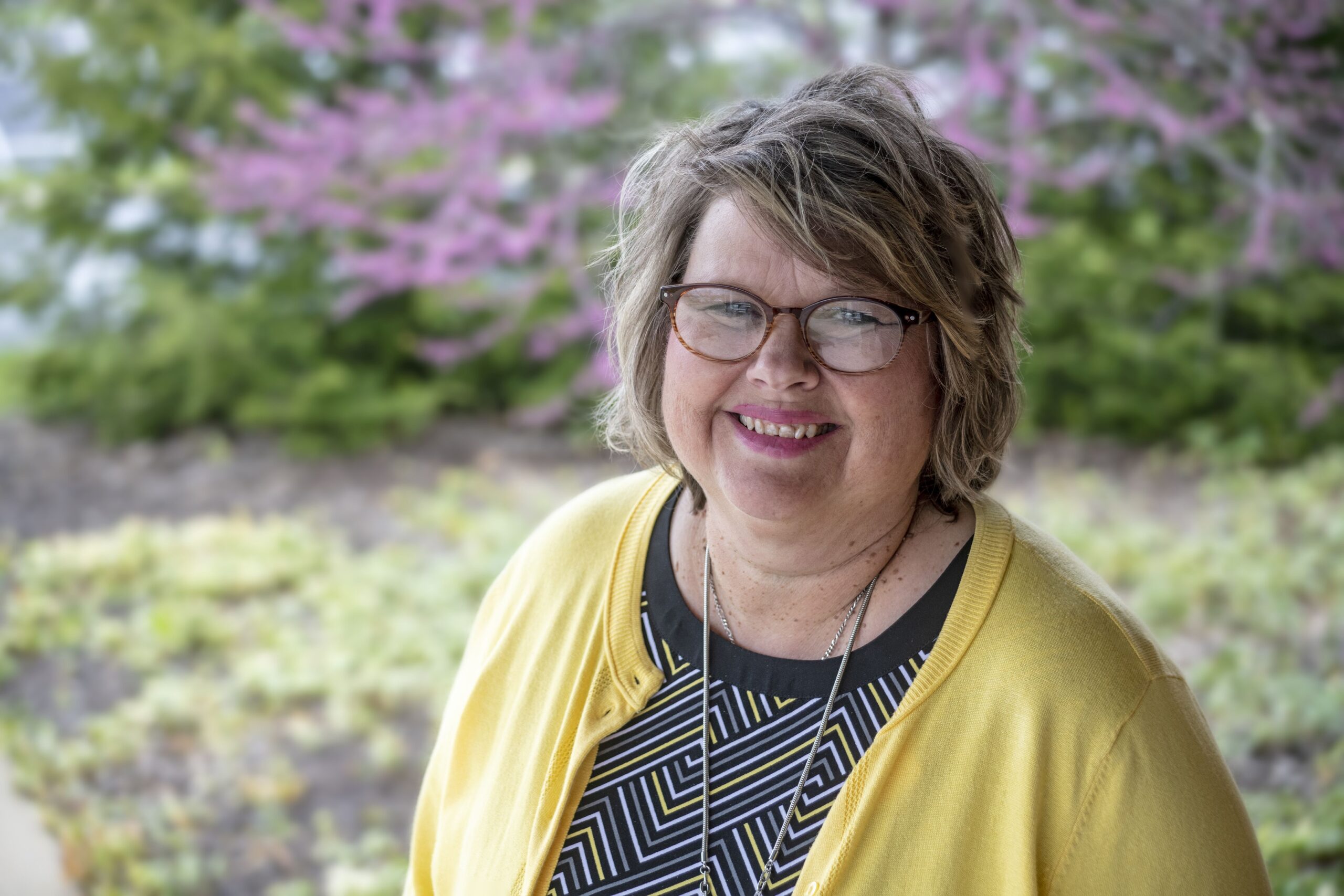The dreams of a boy became the mission of a man as demonstrated by an essay that 65-year-old Steve Wiebe-Johnson penned when he was in second grade.
The essay was found at the bottom of a family memento box kept by his mother, the late Mary (Lind) Johnson. She raised Wiebe-Johnson as the third of seven children born to her and the late Bob Johnson, a longtime Mennonite pastor.
Wiebe-Johnson, who recently retired as Mennonite Mission Network’s co-regional director for Africa and Europe, penned his hopes for someday becoming a missionary in pencil on big-lined paper. He signed it Stephen in rainbow colors at the bottom. The essay, “What I Wish to Be,” read:
I am a little boy. I don’t know what to be can’t decide. If I were a missionary, I would go all over teaching about God and Jesus. I would be a Dr. too and a minister too. I would meet a lot of different people too. I would go to China, India, and all over the world.
Stephen.
“I grew up at a supper table that was always full of guests having serious talks about Christian faith and what it meant to be God’s church," Wiebe-Johnson said during an interview from his home in Richmond, Virigina, that he shares with his wife, Dorothy. "As a result, as a little guy, I had a sense, pretty early on, about God’s leading in my life.”
Indeed, that early sense was very accurate. For more than 40 years, Wiebe-Johnson served in missions internationally and in the United States. His roles ranged from Anabaptist educator to community development worker to administrator. In 2002, he joined Mission Network and before that served with Mennonite Board of Mission (MBM), a predecessor to Mission Network. Prior to this, he served with
Mennonite Central Committee (MCC).
Alphonse Koumuesa, president and legal representative of the Mennonite Church in Congo gave the sermon at Rod Hollinger-Janzen’s ordination, at Waterford Mennonite Church, Goshen, Indiana in 2010. Steve Wiebe-Johnson translated.
Wiebe-Johnson said he learned early that building mutual relationships was pivotal to being a Jesus follower. For example, there was always a lot of give-and-take dialogue at the supper table, laced with curiosity, openness, and mutuality modeled by his parents inside and outside the home.
“Dad was always a big fan of Paul Tillich’s articulation of an I-Thou relationship,” Wiebe-Johnson said. “So, I grew up with a concept of God as being very relational and not top-down. My parents were always very hospitable and welcoming and were always open to people on the margins.”
Also, he was thrust into personal losses and family moves due to ministry transitions. These pushed him to process complicated grief at a young age and to grapple with the feeling that he was often on the outside looking in.
Moise Ahlonsou Gbesse and Steve Wiebe-Johnson travel by boat to a village on stilts in Lake Nokoué, Benin to give a workshop on community development in 1995. Photo by Dorothy Wiebe-Johnson.
“When I was six, I lost sight in one eye,” he said. “In grades six, seven and eight, I lost friends to early accidental deaths. We also moved to Ontario, Canada, from Pueblo, Colorado, and I had to deal with what it meant to be a newcomer trying to fit in."
When he left Canada at age 18 to attend
Eastern Mennonite University in Harrisonburg, Virgina, he experienced the outside-looking-in feelings from the reverse. “Growing up in Ontario meant that I had not been inculcated with the self-understandings of the ‘usual’ high school kid in the States,” he said.
The big-world view modeled by his parents, coupled with his “borderland” experiences, prepared Wiebe-Johnson to quickly grasp a missional perspective of accompanying others rather than a colonial mindset, he said. This served him well with the many para-church organizations and partnerships with whom he was called upon to engage in Africa — including those in Liberia, Ghana, Benin, and Ivory Coast.
“It is not mission workers from other lands who determine the shape of missions,” he said. “New developments are best forged in dialogue with people in their local contexts. To have a lasting impact, one needs to build relationships that are deep and genuine and founded on God’s move through the Spirit beyond our personalities and particular take on life and faith.”
Resiliency born of his early experiences helped him juggle mission assignment surprises. For example, in his early 20s, he went to
Centre Mennonite Paris (Paris Mennonite Center) through MCC to learn French for six months before serving with water projects in Chad. But when war broke out in Chad, he stayed in Paris for three years instead, helping introduce international students to Anabaptism.
While serving with MBM, Steve and Dorothy navigated two wars. A war broke out in Liberia in 1989 where he served in community development and theological education (Dorothy engaged with community health). They were then assigned to do the same in Ghana. They remained there until 1992, when they moved back to the States where Wiebe-Johnson earned his Master of Divinity degree at
Anabaptist Mennonite Biblical Seminary in Elkhart, Indiana. For two years, he taught global studies at
Bethel College in North Newton, Kansas.
In 1995, MBM invited them to serve in Benin, where Wiebe-Johnson became a regional coordinator for Africa. In August 1999, they moved to the Ivory Coast, where he also did administration. When war broke out there, they remained. In 2002, they moved to Elkhart, from where Wiebe-Johnson traveled throughout Africa as a regional director. For a short time before his own retirement, he also assumed regional administration with sites in Europe when Sharon Norton, his former co-director, resigned.
True to his boyhood dreams of becoming a “minister too,” Wiebe-Johnson now serves as part-time pastor at
Warwick Mennonite Church in Newport News, Virgina. He’s not at his boyhood supper table but at the church family table, served by God.
“I strongly desire that people come to the table to openly share their visions,” he said. “I desire they move forward, not by following rules but by listening to where God is calling them, here and now.”











